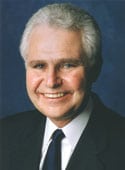Legal & Regulatory
-
Legal & Regulatory
Barriers continue to crimp natural gas supplies
U.S. demand for natural gas is projected to increase by more than 50% by 2020. Companies are building—and the public is opposing—receiving terminals on three coasts that would increase imports of liquefied natural gas. The pros and cons of "opening up" Alaska, coastal waters, and federal lands to drilling are still being debated. These politically […]
-
Legal & Regulatory
Renewable power: Environmental or political product?
What’s in a name? Plenty, if the word is "renewable." Intuitively, most people outside the energy industry consider hydroelectric power "renewable." The dictionary defines the word as follows: "capable of being replaced by natural ecological cycles." Accordingly, rainwater should indisputably qualify as renewable. Yet since the early days of renewable portfolio objectives, most hydro […]
-
Legal & Regulatory
Restricting bids for new capacity raises costs, lowers reliability
Most sponsors of bid solicitations seek to attract the maximum number of high-quality bids. Basic economic principles tell us that the greater the number of respondents to a solicitation, the greater the competition and the greater the benefits to the solicitor. Somewhat counterintuitively, and notwithstanding California’s need for more electricity supply, the state’s utilities are […]
-
Legal & Regulatory
Renewable contracts merit longer terms
The length of term allowed for power sales contracts is a critical determinant of the ability of states to meet their increasingly ambitious renewable power targets. Many utilities advocate limiting terms to 10 or perhaps 15 years for renewable energy contracts, emphasizing the "flexibility" that shorter terms offer. In contrast, contract terms of 20 or […]
-
Legal & Regulatory
Passing on regulatory risks undermines renewable mandates
More than 20 states now require their investor-owned utilities to serve a certain percentage of their load with renewable energy by a date certain. Other states are considering following suit. Failure to meet its "renewable power" mandate can subject a utility to financial and other regulatory penalties. If structured and supervised correctly, these initiatives […]
-
Legal & Regulatory
State monitoring fails the cost/benefit test
Steven F. Greenwald and Christopher A. Hilen Utility regulators in California and other states have begun subjecting power plants to extensive oversight of their O&M activities. These oversight programs are a response to allegations that generators purposely shut operational plants down to drive electricity prices up during the 2000–2001 energy crisis. These state initiatives […]
-
Legal & Regulatory
Facilitate plant siting by relaxing ratemaking constraints
The U.S. needs new generating capacity in coming decades to meet growing electricity demand. The increasing scarcity of land within utility load centers, combined with environmental opposition to the siting of plants, often limits siting options to remote locations. Restricting power plants to distant sites necessitates additional transmission facilities, increases delivery costs and electric bills, […]
-
Legal & Regulatory
Get involved!
The Combined Cycle Users’ Group (CCUG) was formed to address issues of importance to users, particularly the interactions among the major systems of combined-cycle power plants: the steam turbine, combustion turbine(s), and heat-recovery steam generator. The added value of becoming a CCUG member is the opportunity to interact with other operators, as well as designers, […]
-
Legal & Regulatory
Hybrid generation markets endanger competition and innovation
Competition in power generation fosters technical innovation, cleaner power plants, and downward pressure on prices. Before the 1980s, such competition was almost nonexistent: vertically integrated utilities built and operated the vast majority of U.S. plants with oversight by state regulators. The Public Utility Regulatory Policies Act of 1978 and the Energy Policy Act of 1992 […]
-
Legal & Regulatory
Gas storage investment stymied
The U.S. needs to add 600 to 800 billion cubic feet (Bcf) of natural gas storage capacity ASAP. Independent storage providers (ISPs) are the entities best equipped to build this needed infrastructure, but they continue to be restrained by anachronistic regulatory policies. The Federal Energy Regulatory Commission’s (FERC’s) December 2005 rule-making to modify its […]








